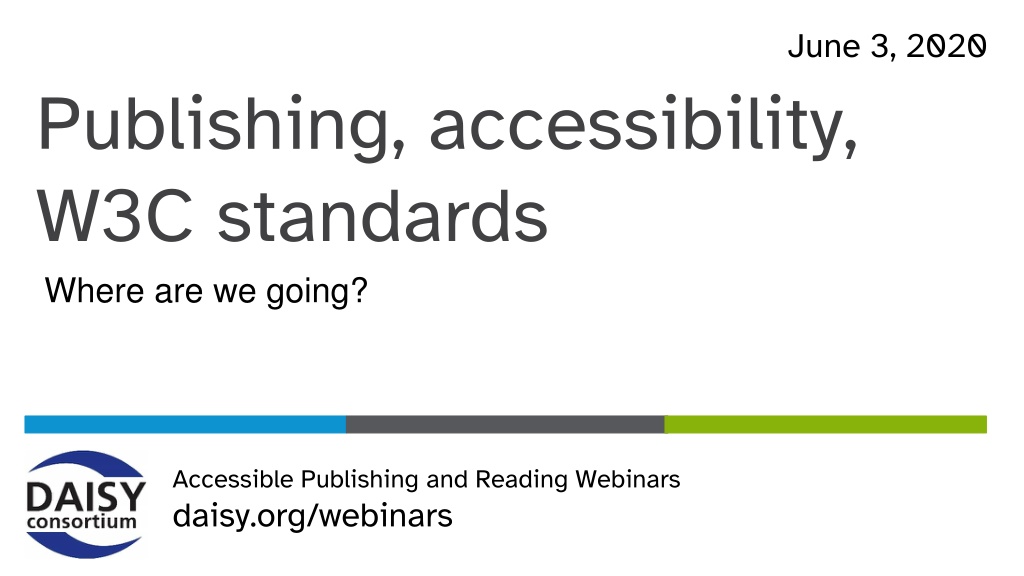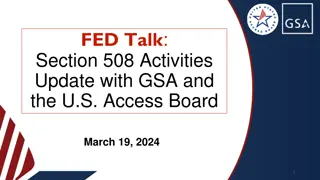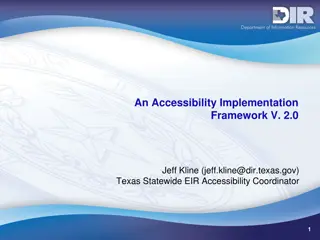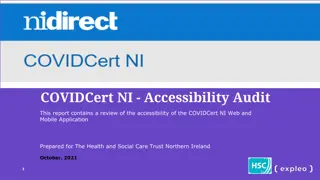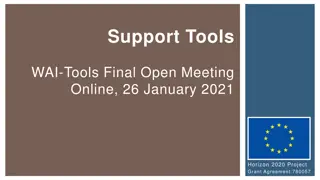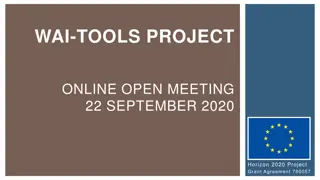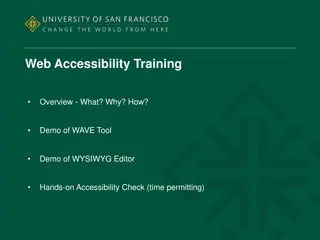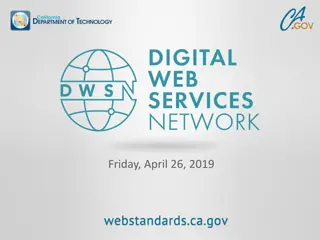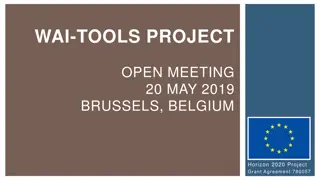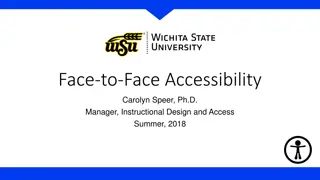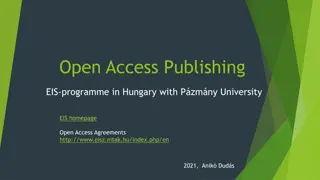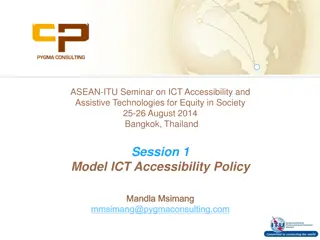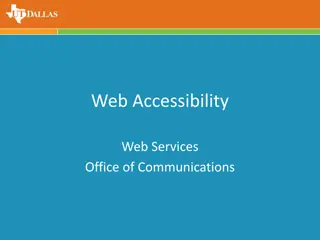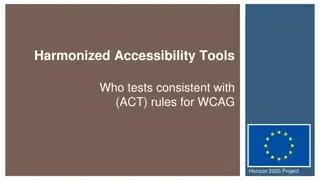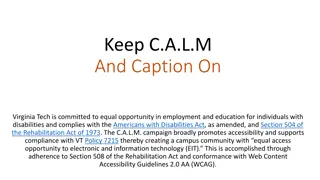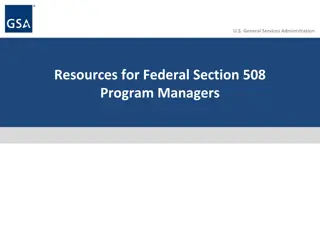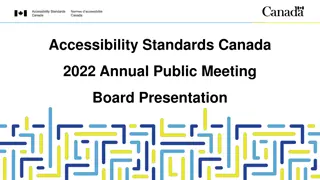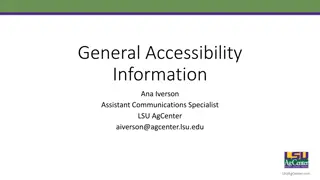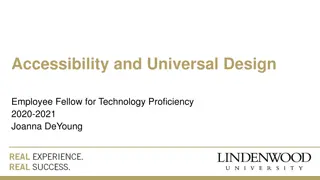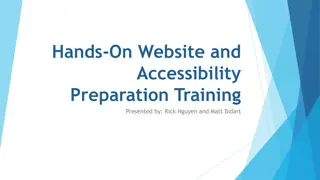Publishing, accessibility, W3C standards
This presentation delves into the evolution of EPUB standards, focusing on accessibility and the future direction of publishing. Featuring discussions on EPUB ecosystem, Reading system conformance, EPUB accessibility updates, metadata crosswalk, and audiobooks. Learn about challenges, aspirations, and insights from industry leaders. Discover how the EPUB Working Group aims to address issues of interoperability and enhance the EPUB format for publishers and readers alike.
Uploaded on Feb 25, 2025 | 0 Views
Download Presentation

Please find below an Image/Link to download the presentation.
The content on the website is provided AS IS for your information and personal use only. It may not be sold, licensed, or shared on other websites without obtaining consent from the author.If you encounter any issues during the download, it is possible that the publisher has removed the file from their server.
You are allowed to download the files provided on this website for personal or commercial use, subject to the condition that they are used lawfully. All files are the property of their respective owners.
The content on the website is provided AS IS for your information and personal use only. It may not be sold, licensed, or shared on other websites without obtaining consent from the author.
E N D
Presentation Transcript
June 3, 2020 Publishing, accessibility, W3C standards Where are we going? Accessible Publishing and Reading Webinars daisy.org/webinars
Your panel Host: Richard Orme Tzviya Siegman, Wiley Chair of the Publishing Working Group, member of the W3C Advisory Board, Publishing Activity Lead Dave Cramer, Hachette Book Group Editor of EPUB 3.2, Chair of the upcoming EPUB3 Working Group, Chair of the former EPUB Community Group Wendy Reid, Rakuten Editor of Audiobooks, Chair of the Publishing Working Group, Chair of the upcoming EPUB3 Working Group
Agenda Introduction Overview of the EPUB ecosystem How standards evolve, etc. EPUB 3 Working Group Reading system conformance Very limited new features EPUB Accessibility Update to EPUB Accessibility spec Accessibility metadata crosswalk DPUB-ARIA and WCAG Audiobooks and Synchronized Narration 1. a) b) 2. a) b) 3. a) b) 4. 5.
How Publishing@W3C works idea EPUB3 Working Group Publishing Working Group Publishing Community Group Publishing Business Group EPUB3 Community Group Publishing Steering Committee
EPUB Today, Tomorrow, Next Year Earlier in 2020 Publishing@W3C hosted a survey of the publishing industry to understand how EPUB was being used. From that data, we learned that EPUB is the format of choice, and publishers like the format, but need it to do more. Requests included things like modernizing our support for HTML and CSS, clarifying support for Javascript, support for WebAPIs, and increasing information for reading system conformance via tests. One big thing we learned is that there s a lot of misunderstandings about EPUB, which we hope improvements to the spec and more communication will fix.
EPUB 3 Working Group: Background 20 years of evolution of EPUB, from OEB 1.0 in 1999 Some aspirational spec writing: If we build it, they will come Lots of existing content of questionable quality, which reading systems sometimes try to patch EPUB spec offers little guidance to reading systems Diversity of reading systems and underlying platforms not all reading systems use modern browser rendering engines like WebKit; the same reading system may work differently on Android vs iOS All these issues combine to make interoperability a challenge
EPUB 3 Working Group: Goals Improve spec quality via W3C s process and rigorous testing Must have multiple implementations of each feature, determined by tests Horizontal review for accessibility, internationalization, security, privacy Improve spec acceptance by governments via W3C s reputation Update spec based on user needs and feedback Keep up with the evolution of the web platform Retain compatibility with existing content and ecosystem 1. 2. 3. 4. 5.
EPUB 3 Working Group: Focus Testing, Testing, Testing Reading System Conformance More Testing Possible New Features Clarifications on scripting and storage Full-bleed images New media types Still More Testing
EPUB 3 WG: Accessibility Specification 1.X Scope: EPUB a11y becomes a formal W3C Recommendation Verify that EPUB A11y Spec meets EU directives for ebooks Consider new and incremental features, as long as they comply with EAA and WCAC 2.x FXL accessibility Referencing specific versions of WCAG Improve spec itself by providing clarifications and reducing ambiguity Timeline: May 2021: First Public Working Draft
Accessibility Metadata Crosswalk The Accessibility Metadata Crosswalk is a project being worked on by a number of members of the publishing activity meeting as the EPUB Accessibility Taskforce. The goal of the crosswalk is to identify any gaps between the accessibility metadata in the major industry standards (Schema, ONIX, and MARC), and suggest methods for filling the gaps in a standardized way. This work is ongoing.
DPUB-ARIA What is ARIA? Accessible Rich Internet Applications Functionally, ARIA roles, states, and properties are analogous to CSS for assistive technologies. For screen reader users, ARIA controls the rendering of their non-visual experience. Incorrect ARIA misrepresents visual experiences, with potentially devastating effects on their corresponding non-visual experiences. What purpose does DPUB-ARIA serve? How can you use it CORRECTLY? ARIA Authoring Practices https://www.w3.org/TR/wai-aria-practices-1.1/
Coming soon DPUB-ARIA 1.1 bug fixes related to HTML validation deprecation of some dpub roles that never worked quite right Doc-endnote (to be deprecated, replace by tagging as <li> within parent doc-endnotes) Doc-biblioentry (to be deprecated, replace by tagging as <li> within parent doc-bibliography)
Accessibility Guidelines The W3C Accessibility Guidelines Working Group (https://www.w3.org/WAI/GL/) works to develop guidelines and support materials to make web content accessible for people with disabilities. WCAG 2.2 expected in Q4 2020, with several new success criteria Cognitive/Learning Disabilities: Accessible Authentication, Hidden Controls, Findable Help, Redundant Entry, Error Correction (Processes) EPUB: Fixed Reference Points Low Vision: Focus Visible (Enhanced) Mobile: Dragging
WCAG 3.0 - on the horizon This is the next generation of WCAG, WCAG 3.0 guidelines are working to incorporate a new approach to testing and conformance that will improve usability and measurability of the Accessibility Guidelines as well a providing a harmonized guidance that applies across web-related technologies. There is so much on the web or with a web interface. WCAG 3.0 looks at a way to offer guidance across technologies as well as provide testing methodologies.
Audiobooks The future looks bright for audiobooks! The W3C Audiobooks specification is on track to reach recommendation status in Q3 2020. Audiobooks has two accompanying specification notes, Lightweight Packaging and Sync Narration, which complete the Audiobooks standard, making it portable, informative, and accessible. Looking to the future, Audiobooks should become the mainstream publishing standard for audio, allowing for more publishers/studios to create born accessible content.
Synchronized Narration The accompanying note for Audiobooks accessibility is Synchronized Narration, the successor to SMIL for content built for the web. Synchronized Narration is a JSON-based method for linking text and media content, in Audiobooks it is used to provide synchronized text to the audio experience.
Further into the Future Web Publication Manifest Manga/Comics/BD Print CSS Web Packaging
Links EPUB Survey Overview and Results: Publishing@W3C EPUB Survey Results EPUB 3.2 Specification: https://www.w3.org/publishing/epub32/ Draft EPUB 3 Working Group Charter: https://w3c.github.io/epub-3-wg-charter/ Audiobooks Demo: https://marisademeglio.github.io/worlds-best- audiobook/web/library/ Accessibility Metadata Crosswalk: http://www.a11ymetadata.org/the- specification/metadata-crosswalk/ DPUB-ARIA 1.0 https://www.w3.org/TR/dpub-aria-1.0/ ARIA Authoring Practices https://www.w3.org/TR/wai-aria-practices-1.1/
Contact information Tzviya Siegman, Wiley tsiegman@wiley.com @TzviyaSiegman Dave Cramer, Hachette Book Group dave.cramer@hbgusa.com @dauwhe Wendy Reid, Rakuten wendy.reid@rakuten.com @wendy_a_reid
Wrap up Webinar video, slide deck and links to resources will be posted at: daisy.org/webinars Coming up: June 10 European Accessibility Act: Considerations for the Publishing Industry and Benefits to Consumers Globally June 17 Describing Images in Publications Guidance, Best Practices and the Promise of Technology June 24 Metadata in publishing the hidden information essential for accessibility
